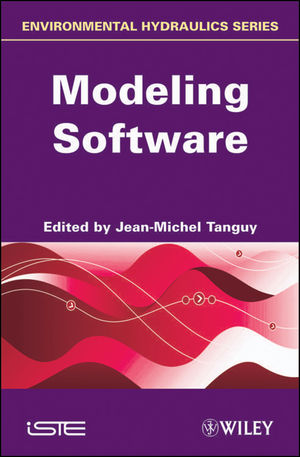Modeling SoftwareISBN: 978-1-84821-157-5
Hardcover
320 pages
November 2010, Wiley-ISTE
 |
||||||
Introduction xv
PART 1. 3D MODELS 1
Chapter 1. Non-Linear Waves With REFLUX 3D 3
Philippe SERGENT
1.1. Context 3
1.2. Data required for implementation 13
1.3. Specific numerical methods 14
1.4. Modeling options 17
1.5. Results output by the code, and operation 21
1.6. Examples of models 25
1.7. Bibliography 25
Chapter 2. Current Modeling with TELEMAC3D 29
Jacques CHORDA and Marie-Madeleine MAUBOURGUET
2.1. TELEMAC3D: 3D hydrodynamics at a free surface 29
2.2. Equations used in TELEMAC3D 30
2.3. Choices of 3D mesh 31
2.4. Specific features 31
2.5. Simple transition from TELEMAC2D to TELEMAC3D 32
2.6. Application example 32
2.7. Bibliography 34
Chapter 3. Atmospheric Modeling 35
Jean PAILLEUX
3.1. The rise of modeling as a tool in meteorology 35
3.2. Operational weather forecasting models 36
3.3. Towards kilometer-scale numerical forecasting – the AROME model 40
3.4. Bibliography 43
Chapter 4. Groundwater Flow Modeling in Porous Media Using
MARTHE 45
Dominique THIÉRY
4.1. Application area 45
4.2. References 46
4.3. Technical features 47
4.4. Structure of the code 49
4.5. WinMarthe preprocessor 51
4.6. Simulation of the migration of a pollution plume 54
4.7. Complex hydrogeological configurations 56
4.8. Biphasic simulation of saline intrusion 59
4.9. Infiltration of imiscible TCE (tetracholoethylene) into heterogenous sand initially saturated with water 60
4.10. Biphasic simulation of water injected at four points into an aquifier initially saturated with oil 60
4.11. Biphasic simulation of methane storage in an aquifer 60
PART 2. 2D MODELS 63
Chapter 5. Meteorology and Hydrology 65
Florence HABETS
5.1. Bibliography 69
Chapter 6. Hydrological Modeling with MARINE 71
Marie-Madeleine MAUBOURGUET
6.1. General description of MARINE 71
6.2. Description of pre-processing 72
6.3. Description of the hydrological module 73
6.4. Description of river transport 78
6.5. Application examples 78
6.6. Bibliography 80
Chapter 7. Distributed Hydrological Modeling – the
ATHYS Platform 83
Christophe BOUVIER, Anne CRESPY, Agnès L’AOUR-DUFOUR,
François Noël CRES, François DESCLAUX and Arthur
MARCHANDISE
7.1. General description of ATHYS 83
7.2. Pre-processing phase 84
7.3. Description hydrological models 86
7.4. Description of post-processing 92
7.5. Applications 93
7.6. Conclusions and future directions 99
7.7. Bibliography 100
Chapter 8. Operational Applications of the LARSIM Model for
Flood Forecasting 101
Norbert DEMUTH
8.1. The problem 101
8.2. Structure of the LARSIM model 101
8.3. Operational mode – summary 102
8.4. Quality control and validation of input data 103
8.5. Spatial interpolation of rainfall data 105
8.6. Launching a forecasting simulation 105
8.7. Analysis of results, and experiments performed by the flood prediction services 105
8.8. Bibliography 107
Chapter 9. Real-Time Runoff – Infiltration Models:
TOPMODEL 109
Georges-Marie SAULNIER
9.1. Introduction 109
9.2. TOPMODEL philosophy 110
9.3. Advantages of TOPMODEL 113
9.4. Forcing and predicted variables in TOPMODEL 113
9.5. Analytical basis 116
9.6. Bibliography 117
Chapter 10. Currents with TELEMAC2D 119
Marie-Madeleine MAUBOURGUET and Jacques CHORDA
10.1. TELEMAC2D: hydrodynamics and the environment 119
10.2. The TELEMAC system 120
10.3. Original features and customizable code 121
10.4. TELEMAC as a training tool for hydraulic engineers 122
10.5. Bibliography 126
Chapter 11. 2D Model of Sediment Transport with RUBAR 20TS
129
André PAQUIER
11.1. Description of the 2D RUBAR 20TS model 129
11.2. Bibliography 138
Chapter 12. NAVMER: Ship Trajectory Simulator 139
Yann HOLLOCOU
12.1. The simulator 139
12.2. Simulations of a passenger vessel on the Seine 140
12.3. Sixth crossing on the Seine 141
12.4. Le Havre Port 2000: navigability of outer reaches 145
12.5. Port of Nice 146
12.6. Outlook 153
PART 3. 1D MODELS 155
Chapter 13. Waves Using VAG 157
Philippe SERGENT
13.1. Context 157
13.2. Results from the operational code 162
13.3. Examples of models 163
13.4. Bibliography 163
Chapter 14. Real Time Discharge-Discharge Models with SOPHIE
165
Marie-Pierre NÉRARD
14.1. Discharge-discharge relationships 166
14.2. Rainfall-runoff models 170
14.3. Other models 172
14.4. Which model to use? 174
Chapter 15. 1D Flow Models: Comparing MASCARET and RUBAR 3
177
André PAQUIER, Patrick CHASSÉ, Nicole GOUTAL and
Amélie BESNARD
15.1. Analysis of Saint-Venant equations for transcritical flows 177
15.2. Numerical solution of sub-critical and super-critical regimes for the 1D Saint-Venant equations: examples of the RUBAR 3 and MASCARET computer codes 184
15.3. Example calculation: propagation of the dam-break wave for the Malpasset barrage 194
15.4. Bibliography 198
Chapter 16. 1D Compartment Flow Models 201
Jean-Baptiste FAURE and André PAQUIER
16.1. Context 201
16.2. Modeling options 202
16.3. Data required for implementation 203
16.4. Specific numerical methods 205
16.5. Code output and analysis 206
16.6. Examples of models 206
Chapter 17. CANOE: an Urban Hydrology Software Package
209
Bernard CHOCAT
17.1. Origin 209
17.2. General description 209
17.3. Structural data management (project) 211
17.4. Management of structure catalog (transport) 212
17.5. Management of hydrometric data (rainfall) 213
17.6. Hydrological and hydraulic simulation 213
17.7. Water quality simulation 215
17.8. Project assistant 216
17.9. CANOE-GIS 217
17.10. Examples of pre-and post-processing workflows 217
Chapter 18. Water Quality with ProSe 219
Patrick GOBLET and Stéphanie EVEN
18.1. Hydrodynamic model 219
18.2. Transport model 220
18.3. Sediment exchange 220
18.4. Biochemical model 222
18.5. Bibliography 224
Chapter 19. Substance Transport 227
Jean-Baptiste FAURE
19.1. Context 227
19.2. Modeling options 228
19.3. Data required for implementation 229
19.4. Specific numerical methods 230
19.5. Results from the code, and analysis of results 232
19.6. Bibliography 232
Chapter 20. 1D Sediment Transport with RUBARBE and TSAR
233
André PAQUIER
20.1. RUBARBE code 233
20.2. Sediment description for the river bed 235
20.3. Method of solution 236
20.4. Sedimentary balance within a mesh cell 236
20.5. Shear stress calculation 238
20.6. The TSAR code 240
20.7. Bibliography 243
Chapter 21. An Integrated Simulation Platform – PamHyr
245
Jean-Baptiste FAURE
21.1. Overview 245
21.2. Key features of a hydraulic modeling environment (HME) 246
21.3. PamHyr: an example HME 247
21.4. Bibliography 251
List of Authors 253
Index 257
General Index of Authors 259
Summaries of Other Volumes in the Series 261



